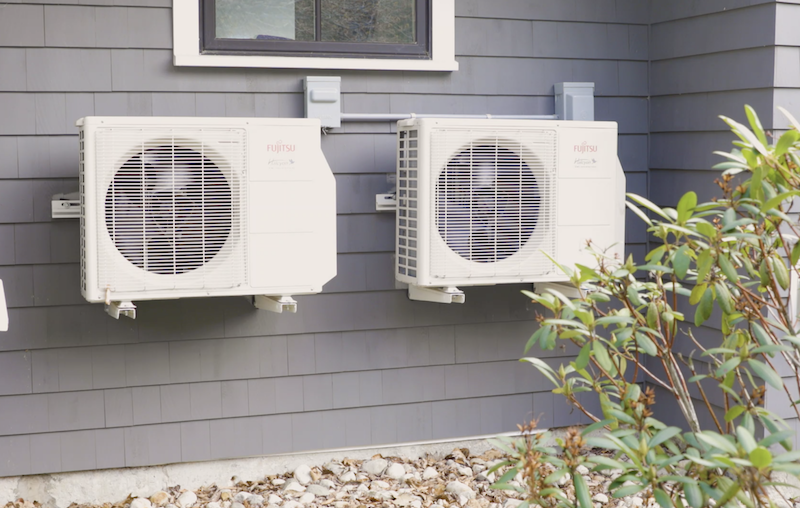
Beat the heat with heat pumps this summer – and help fight climate change while you're at it. Photo: Ecophotography.
This is my first summer in Boston. I was warned many times that despite the frigid New England winters, the summers could get very hot. So, when my closest friend asked me to housesit this summer, I responded with a resounding NO. She didn’t have air conditioning. How was I supposed to endure the heat?
My friend kept insisting that her heat pump would do the trick. Frankly, I was dismissive at first. I thought heat pumps were only meant to warm your house in the winter. But she wore me down, and finally, begrudgingly, I agreed. One month in, I’m glad to say I’ve been proven wrong. Heat pumps can keep you cool. Let’s explore how heat pumps work to both heat and cool our homes – and how that makes them a great tool to fight climate change.
Heat Pumps Work in the Summer, Too
In the summer, heat pumps extract heat from the room. They absorb the heat from the air inside your home and expel it outdoors – the reverse of what they do in the winter (absorb heat from the air outside and draw it into your home). Yes – this even works in the sizzling heat and the icy cold. These are aptly called air-source heat pumps and are the most common type for houses and apartments.
Ground-source heat pumps diffuse heat from the air into ground via cooler rock, soil, or ground water around it. While more cost-efficient in the long term, ground-source heat pumps have a higher upfront installation cost than air-source heat pumps. So, ground-source heat pumps are suitable for larger buildings like corporate offices. Boston University’s new computer center is an example of a ground-source heat pump in use.
Now we know heat pumps can pump out cool air in the summer. So, why would we choose them over the standard air conditioner or central air unit?
Slashing Climate Pollution
Climate change is affecting the region here and now. According to NOAA, New England is warming faster than the rest of the country. The culprit here in New England and worldwide is carbon pollution from burning fossil fuels.
Unfortunately, fossil fuels like natural gas are a huge part of electricity generation in New England. In Massachusetts, for example, gas generates over half of the state’s electricity. One way to slow the climate crisis is to cut down on the amount of energy our appliances use, otherwise known as energy efficiency.
Air conditioners consume a lot of electricity, emitting significant climate-damaging pollution. In fact, the U.S. Department of Energy says that air conditioning units across the country cost homeowners about 29 billion dollars and are responsible for roughly 117 million metric tons of carbon dioxide each year.
In contrast, heat pumps consume less electricity than air conditioners, emitting less climate-damaging pollution. While we transition our electricity generation to clean energy like solar and wind, making sure our appliances are energy efficient and therefore using fewer fossil fuels is critical to slowing climate change.
Additionally, energy efficiency helps us conserve energy during extreme heat, which is beneficial for two main reasons. First, during those dreadful 90-degree days when everyone has their air conditioners and fans on, we have to turn on specific reserve power plants to meet heightened energy demands. These power plants often burn the dirtiest and most climate-damaging fossil fuels, like oil and coal – and tend to cost customers the most money on their electricity bills. Additionally, energy efficiency reduces stress on the electricity grid during these periods of extreme heat, helping prevent power outages when people need to use electricity the most.
Cutting Your Electricity Bills
Another benefit of using less electricity is lower electricity bills. Not only can heat pumps reduce your own energy bills, but if every home, business, and public space is more efficient, the price of energy will go down across the board as electricity demand falls.
Energy efficiency is especially important when we consider how expensive and price volatile New England’s electricity prices are. Our region relies heavily on burning imported fossil fuels like natural gas to generate electricity, which means our gas must travel long distances to reach our homes – increasing its cost. Additionally, because of New England’s dependence on imported liquified natural gas, we must contend with drastically inflated prices when international crises affect supply lines.
The short story? The cost of fossil fuel-generated electricity is expensive and unpredictable. So, heat pumps can insulate families and businesses from the costly consequences of fossil fuels by consuming less electricity and lowering energy demand across the board through state-wide adoption as we move towards clean energy.
Getting Heat Pumps to All of New England
The upfront costs of installing heat pumps are nothing to ignore despite their long-term cost savings. That’s why state and federal governments need to step in and ensure heat pumps are affordable and accessible to everyone.
Thankfully, our governments are making progress in supporting households’ transition to a cleaner, energy-efficient lifestyle. For example, Vermont recently passed the Affordable Heat Act, which requires companies that import fossil fuels for home heating to help residents switch to cleaner heating systems, such as heat pumps. And CLF is tracking Massachusetts’ planned Clean Heat Standard. We want the Massachusetts version to support widespread use of heat pumps across the Commonwealth rather than false climate solutions like so-called “renewable natural gas.” In addition to the states’ incentives, a federal law – the Inflation Reduction Act – establishes tax credits and rebates for heat pump installation.
Even with these advances, however, there is a long way to go. We need your help to push our governments to fight climate change by supporting energy-efficient technology. You can make a difference by voicing your opinions and advocating for heat pumps at the state and federal levels. Stay informed with CLF’s work via our e-news, where you’ll find opportunities to act to support climate policy and legislation in New England. And here at CLF, we’ll keep fighting to make sure that climate solutions like heat pumps are affordable and accessible to everyone.
So, as you beat the heat (like I am), remember that heat pumps can ALSO cool your home while saving you money on utility bills and slashing carbon pollution. And nothing could be more relaxing in the summer heat than knowing that staying chilled doesn’t have to warm the planet even further.



